
5 reasons to study general engineering

The engineering industry is broken down into a lot of different fields, all of which work together to build new solutions that improve our everyday lives. For instance, civil engineers are often behind the design and construction of the roads and bridges we use, whilst electrical engineers are more likely to have developed the systems that keep them well-lit and control the traffic. The industry is so broad, that it probably had something to do with most of the things you see and use; from software programmes and medical devices to rollercoasters and even the clothes you wear.
For those hoping to study engineering, choosing a specialism may feel like an impossible task. Sound familiar? Our Global Design Engineering programme, which is a generalised degree covering multiple engineering specialisms, may be a good fit for you.
We spoke to TEDI-London industry partner and Visiting Professor, Professor Laurie Rowe – who studied a generalised engineering degree – to find out why she thinks aspiring engineers should do the same:
1. It keeps your options open
If you know you want to be an engineer, but not where to specialise, opting for a generalised degree that gives you a strong foundation of knowledge across multiple fields will give you the chance to explore and keep your options open to specialise later. Studying a generalised degree like TEDI-London’s Global Design Engineering at BEng level will put you in a great position to specialise either in industry or at MEng level. It will also pave your way to achieving professional registration status either as an Incorporated Engineer (IEng) or a Chartered Engineer (CEng) in a specialist area of the industry later on.
2. You’ll better understand the bigger picture
When it comes to projects that engineers work on in industry, multiple specialisms will usually be needed to develop the product or solution. A generalised degree will give you a better understanding of how these all relate to one another within the context of a project, because you’ll be more clued up on what the role of each area of engineering is. Not only will this give you a better idea of what each team member is working on and support them through issues, but you’ll also have a more well-rounded understanding of the project overall, which will help prepare you to manage and oversee it.
3. You’ll have a bigger breadth of opportunities once you graduate
A generalised engineering degree will equip you with the agility to move between sectors, a quality that is valued by industry employers. This can come with huge benefits – particularly for those hoping to work for a large organisation – because graduates with a broad set of engineering skills can be deployed across a range of projects and serve clients in a variety of ways. Your broader skillset may even put you in a better position to work within international subsidiaries of your employer, opening up fantastic opportunities for travel.
The ability to adapt could also pave the way for you to work on exciting and innovative projects when they come along. The industry is changing fast and 60% of the jobs that current engineering undergraduates will go on to have don’t exist yet. The ability to adapt to change is crucial for future engineers, and a generalised degree will help you prepare.
4. You’ll develop more workplace skills
As well as picking up more engineering skills and knowledge, a generalised degree will also help you develop other key workplace skills, like collaboration and communication. This is because your peers are much more likely to have different strengths to you. For instance, in a software engineering degree, you’ll probably come across lots of course mates with computer science backgrounds. Whereas in Global Design Engineering, some of you might be more creative-minded, whilst others might be natural mathematicians. As such, you’ll learn how to convey your ideas to those with different backgrounds as well as discovering how to best learn from them. Getting used to working alongside people with different skillsets to you and pooling together the different strengths within the team will be very valuable in the world of work.
5. You’ll learn to put the problem first
Regardless of the project, it is crucial for engineers to put the problem itself at the heart of the solution. This means understanding the impact your work will have environmentally, economically, and socially, whilst also considering the needs and perspectives of the stakeholders and end users. Having knowledge that spans multiple specialisms will give you a better idea of which will come into play for a particular project, so you’ll be able to draw upon different areas as needed to solve the problem, rather than approaching it with just one specialism in mind.
Does a generalised engineering degree sound like a good fit for you? Learn more about studying Global Design Engineering at TEDI-London.
More Industry partners articles


What are industry employers looking for from engineering graduates?
